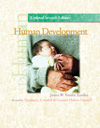 |  Human Development: Updated, 7/e James Vander Zanden,
Ohio State University
Thomas Crandell,
Broome Community College
Corinne Crandell,
Broome Community College
Late Adulthood: Emotional and Social Development
Chapter OutlineChapter 18 takes a close look at the period of late adulthood and the psychosocial domain. Several important topics are covered, including:
1The Psychosocial Domain. The psychosocial tasks of later adulthood are described, as viewed by Erikson and Peck. Major personality patterns of late adulthood are introduced. Research data are also presented from an examination of the relationship between self-concept and life satisfaction in later adulthood. |
 |  |  | 2Theories of Adjustment to Aging. Several theories describing changes in the elderly in terms of the changes in their social environment are examined. These include (1) disengagement theory, (2) activity theory, (3) role exit theory, (4) social exchange theory, and (5) trait theory. |
 |  |  | 3Family. Topics include being single, and the effects of siblings and grandchildren on the elderly. |
 |  |  | 4The Psychosocial Aspects of Aging. Several topics are covered in this section, beginning with retirement, changing marital relations, and kin and friendship ties. Data dealing with the roles and functions performed by grandparents are then presented. A close examination is made of different types of institutional, home, and day care for the elderly. Finally, the significance of personal control and choice in influencing the well-being of elderly nursing home residents is discussed. |
|



 2003 McGraw-Hill Higher Education
2003 McGraw-Hill Higher Education